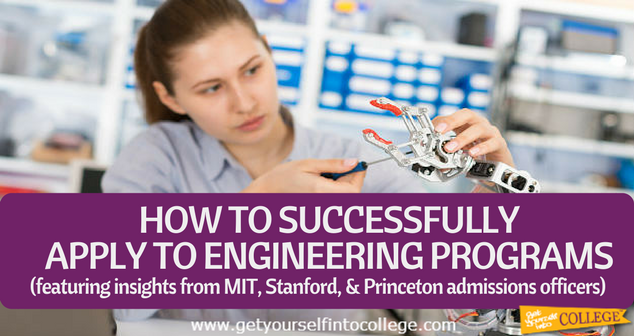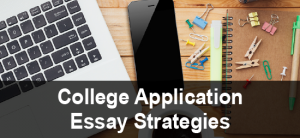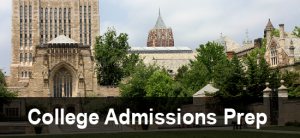You need to employ some specific strategies if you want to successfully apply to engineering programs.
I work with a lot of students interested in engineering and want to share with you 5 strategies that will help you strengthen your positioning.
In this guide, I’m. . .
- Dispelling some common misunderstandings about what it takes to successfully earn admission to engineering programs
- Revealing what admissions officers are looking for in applicants interested in engineering (including insights from MIT, Princeton, Stanford, the University of Pennsylvania, Cornell, and Tufts) and trends in engineering programs
- Sharing important details about recommendations
- Asking you questions that will help you take more meaningful action in relation to your interests (mostly useful for 9th-11th graders who are looking to engage in more effective preparation)
SENIORS: While reading about the intellectual and personal qualities that matter to engineering programs and admissions committees, think about how you can show (not just state) these characteristics in your main application essay (usually your Common App essay) and in your supplemental essays. CLICK HERE for my 2018-2019 Guide to the Common Application Essay.
TIP #1 It’s not enough to take the most rigorous math and science classes and perform well in them.
You’re going to need recommendations from a math and/or science teacher, preferably one you had in 11th grade.
Great recommendations help admissions officers understand your particular strengths in math and science as well as any advanced independent or extracurricular math and science projects you’ve worked on in high school.
It’s also useful for teachers to share details about other skills and personal qualities essential for your success in engineering programs.
An admissions officer at Tufts points out that committees are interested in learning about things like your:
- Ability to collaborate with others
- Process of problem solving
- Capacity for systematic thinking
- Adaptability
- Ability “to survive under tough circumstances”
Take a look at how these skills and qualities connect to what MIT says in “The Match Between You and MIT”:
“The core of the MIT spirit is collaboration and cooperation. . . .Many of the problem sets (our affectionate term for homework) at MIT are designed to be worked on in groups; cross-department labs are very common.”
MIT “wants to admit people who are not only planning to succeed but who are not afraid to fail. When people take risks in life, they learn resilience as a result – because risk leads to failure as often as it leads to success. The most creative and successful people – and MIT is loaded with them – know that failure is part of life and that if you stay focused and don’t give up, goals are ultimately realized.”
Before returning to the issue of teacher recommendations, I want to ask you a few questions:
- How are you cultivating these kinds of qualities and skills as a high school student?
- What could you do to engage in more in-depth collaborative work?
- How are you putting yourself out there and taking intellectual risks?
- What kind of project do you fantasize about doing but have been holding back on because you’re afraid of failing or don’t even know where to start? What can you do right now to start taking action?
- Where in your college applications can you share compelling anecdotes that reveal these qualities and skills?
Your recommenders need to know you, not just your scores.
Building meaningful connections with your teachers takes time, but it’s a wise investment of your time that can pay off in many ways.
Obviously, a teacher who really knows you can write a more detailed and powerful recommendation. But there is a deeper value to establishing an intellectual connection with your teachers.
When a teacher knows what questions and issues intrigue you and understands your genuine interest in specific fields, you increase your chances of him or her becoming a mentor who can point you in the right direction, tell you about opportunities, and help you take yourself to the next level.
WARNING! Sincerity is essential. Trying to show off and impress your teachers just for the sake of recommendations is likely to backfire, and you really don’t want to be a disingenuous kind of person. You want to build an authentic supportive network.
Here are some more questions for you to consider and take action on:
- What can you do to start helping your teachers learn more about the way you grapple with complex math and/or scientific concepts?
- How can you help your teachers see that you possess the types of skills and qualities we’ve been focusing on so far?
- Want more specific support to develop tactful, appropriate, and authentic ways of building connections with your teachers and earning great recommendations? Join the online Get Yourself Into College® program.
TIP #2: Earning the highest possible scores on the math and science parts of your standardized tests isn’t enough.
It’s true that admissions officers considering you for engineering programs care a great deal about your performance on the math and science sections of your standardized tests (SAT or ACT) and your scores on the SAT Subject Tests.
(CLICK HERE to read an article a current MIT student wrote about SAT Subject Tests.)
However, top engineering programs are looking for more than just your ability to excel in these areas.
Let’s take a look at what Princeton says about what they are looking for in applicants to their engineering program and what classes you should “take in high school to prepare for studying engineering”:
“We are especially interested in students who have done well in the most challenging program of courses that was available at their high school, have particular strengths in math and science, and who have a sense of intellectual curiosity about technology and its role in the modern world.”
“Princeton strongly recommends that applicants submit the results of two SAT II subject tests. Applicants who intend to pursue a B.S.E. degree should include among these either the Level I or Level II mathematics test and either the physics or chemistry test.”
“Do not neglect English, social studies, foreign language, and history, for all these subjects are important in engineering education as well. Read widely and write often.”
MIT requires you to submit two letters of recommendation: “One recommendation (“Evaluation A”) should be from a math or science teacher, and one (“Evaluation B”) should be from a humanities, social science or language teacher.”
Ask yourself these questions:
• Why do you think the humanities and social sciences are “important in engineering education”? What kinds of skills and habits of mind do they cultivate?
• What can you do to strengthen your interest and performance in these fields?
• Which non-math and science teachers could write you a very strong recommendation?
• Where in your college application material can you shed light on your reading and writing habits and your understanding of the value of fields outside of engineering?
TIP #3: Tap into your curiosity.
A lot of high school students don’t understand that college admissions officers are looking for evidence of intellectual curiosity.
That is, they don’t just want to see a list of accomplishments (though your accomplishments are, of course, important). They want to learn more about what intrigues you, why these things intrigue you, and your process of taking action on your curiosity.
Colleges don’t want students who just grind and grind away doing things that they think are going to look good in their applications! Colleges want interested and interesting students.
Again, let’s listen to what MIT says:
“Of course you need good scores and good grades to get into MIT. But most people who apply to MIT have good grades and scores. Having bad grades or scores will certainly hurt you, but I’m sorry to say that having great grades and scores doesn’t really help you – it just means that you’re competitive with most of the rest of our applicants. . . .
It’s who you are that really matters. It’s how you embrace life. It’s how you treat other people. It’s passion. And yes, that stuff really does drip off the page in the best of our applications. It’s not anything I can explain – you just know when you read an application and a “perfect match” is there.”
Also, let’s consider one of Stanford’s new short essays:
“The Stanford community is deeply curious and driven to learn in and out of the classroom. Reflect on an idea or experience that makes you genuinely excited about learning. (100 to 250 words)”
This supplement on curiosity and intellectual excitement replaced the old one on “intellectual vitality” (“Stanford students possess an intellectual vitality. Reflect on an idea or experience that has been important to your intellectual development.). I like Stanford’s 2017-2018 update to this supplement because they make what they mean by “intellectual vitality” far more explicit.
As Stanford points out, they “want to see your commitment, dedication, and genuine interest in expanding your intellectual horizons; both in what you write about yourself and in what others write on your behalf. We want to see the kind of curiosity and enthusiasm that will allow you to spark a lively discussion in a freshman seminar and continue the conversation at a dinner table.” Stanford also wants to “see the initiative with which you seek out opportunities that expand your perspective and that will allow you to participate in creating new knowledge.”
Here are some questions for you:
- What are you really curious about (in general and in relation to engineering)?
- How are you pursuing these interests, questions, issues, and problems?
- Are you wasting your time doing things only because you think they’ll look good on your college applications? If so, how could you ditch those things and focus on things that you find truly exciting?
- How and where can you convey your intellectual curiosity (by showing, not just telling) in your college applications?
Tip #4: Take action outside of the classroom by working on projects that solve problems.
Participating in extracurricular activities related to things like robotics, Science Olympiad, and design is a great idea that you probably already know about, so let’s delve a little deeper.
The University of Pennsylvania notes that they are looking for “an ability to innovate, design, and practically apply scientific discoveries” when reviewing applications to the School of Engineering and Applied Science.
Cornell’s engineering program requires you to write a 650-word (max) supplement in response to this prompt:
“Cornell Engineering celebrates innovative problem solving that helps people, communities…the world. Consider your ideas and aspirations and describe how a Cornell Engineering education would allow you to leverage technological problem-solving to improve the world we live in.”
This new 2017-2018 Cornell supplement on problem solving replaces the older one that required you to tell them “about an engineering idea you have, or about your interest in engineering.” In this same essay, you were asked to “describe how your ideas and interests may be realized by “and linked to” specific resources within the College of Engineering and to “explain what a Cornell Engineering education will enable you to accomplish.”
(CLICK HERE to read my more detailed guide to writing great Cornell supplements.)
I want to share with you some valuable insights from Paul Basken’s “Teaching Young Engineers to Find Problems, Not Just Solve Them” (The Chronicle of Higher Education – January 2016).
Basken focuses on how “universities nationwide” are attempting to “teach undergraduates to think more broadly and aggressively about how they can help solve real-world problems.”
Classes like Franklin W. Olin College of Engineering’s “User Oriented Collaborative Design” “focuses not on designing a product, but on simply asking people about their lives and learning from their answers to identify unmet needs.” Students “chose to concentrate on elderly people, and then spent a couple of hours interviewing residents of an assisted-living facility,” where they “learned that being dependent on wheelchairs makes it tougher to avoid weight gain” and even tougher “to measure bodyweight.” Amos Meeks, a student in that class, co-founded Lilypad Scales, “a company that produces low-cost scales designed for wheelchair users,” right after graduating.
The Grand Challenges course at the Rose-Hulman Institute of Technology assigns students a “specific place in the world” and asks them “to research the local population and figure out a technology that might help them. That’s led to classes designing filters to clean water in Kenya and inventing a process for converting plastic trash into roofing tiles in Haiti.”
Here are some questions for you:
- What engineering breakthroughs do you find most exciting? Why do you find them exciting?
- Where you could read more about cutting-edge work in engineering?
- How can you find ways of identifying “unmet needs” and coming up with ways of possibly solving them?
- What kinds of “real-world problems” do you want to solve through engineering?
- Could you use the Common App essay about a problem you’ve solved or would like to solve to reveal your passion for engineering?
Tip #5: Learn how to describe why you are interested in engineering.
This tip seems so obvious, but so many students have a very hard time articulating what it is that they find so compelling about engineering.
Schools like Cornell (see previous tip), the University of Pennsylvania, and Columbia are looking to learn about your “expressed reasons for pursuing an engineering education.”
Applicants to Columbia’s The Fu Foundation School of Engineering and Applied Science need to tell admissions officers “what from your current and past experiences (either academic or personal) attracts you specifically to the field or fields of study that you noted in the Member Questions section.”
Students applying to Penn are asked: “How will you explore your intellectual and academic interests at the University of Pennsylvania?”
Here are some questions:
- What is the path that’s led you to engineering?
- What branch of engineering do you find most interesting? Why?
I recommend checking out TryEngineering to get some quick overviews of the different branches and EngineerGirl to get a more behind-the-scenes understanding of engineering. You should also spend time exploring the way your colleges describe their engineering programs.
YOUR NEXT STEPS
I hope you found these tips useful and that you adapt them to fit your specific interests and goals.
Want more personalized support?
Register for a one-time online consultation with me to get a blast of customized advice or join the comprehensive program for more ongoing support.
You might also want to watch the video version of this article on how to successfully apply to engineering programs.
Blog post image used: ©trans961/bigstock.com



